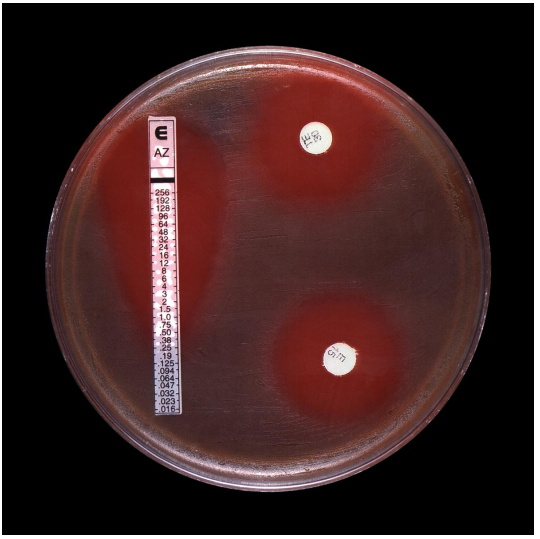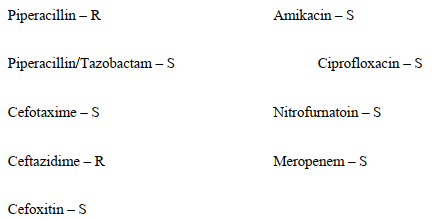Deck 11: Susceptibility Testing
Question
Question
Question
Question
Question
Question
Question
Question
Question
Question
Question
Question
Question
Question
Question
Question
Question
Question
Question
Question
Question
Question

Unlock Deck
Sign up to unlock the cards in this deck!
Unlock Deck
Unlock Deck
1/22
Play
Full screen (f)
Deck 11: Susceptibility Testing
1
Which of the following criteria is considered the most important when selecting an antibiotic for treating meningitis?
A) Potential for allergic reactions
B) Ability to cross blood-brain barrier
C) Cost
D) Dosage intervals
A) Potential for allergic reactions
B) Ability to cross blood-brain barrier
C) Cost
D) Dosage intervals
Ability to cross blood-brain barrier
2
An individual who exhibits rash and hives on starting treatment with penicillin may also exhibit these same symptoms with
A) cephalosporins.
B) carbapenems.
C) monobactams.
D) vancomycin.
A) cephalosporins.
B) carbapenems.
C) monobactams.
D) vancomycin.
cephalosporins.
3
Which of the following antibiotic classes acts on the organism's protein synthesis?
A) Beta-lactams
B) Glycopeptides
C) Carbapenems
D) Aminoglycosides
A) Beta-lactams
B) Glycopeptides
C) Carbapenems
D) Aminoglycosides
Aminoglycosides
4
The key to the successful use of bacteriostatic antibiotic in treating an infection is
A) the compliance of the patient.
B) an immunocompetent state.
C) its spectrum of activity.
D) its mode of administration.
A) the compliance of the patient.
B) an immunocompetent state.
C) its spectrum of activity.
D) its mode of administration.

Unlock Deck
Unlock for access to all 22 flashcards in this deck.
Unlock Deck
k this deck
5
Which of the following antibiotics is considered bactericidal?
A) Tetracycline
B) Erythromycin
C) Vancomycin
D) Clindamycin
A) Tetracycline
B) Erythromycin
C) Vancomycin
D) Clindamycin

Unlock Deck
Unlock for access to all 22 flashcards in this deck.
Unlock Deck
k this deck
6
Aerobes are intrinsically resistant to metronidazole because
A) the antibiotic must be reduced to be active.
B) they are able to actively pump out the antibiotic.
C) the antibiotics cannot cross their cell wall.
D) they produce destructive enzymes.
A) the antibiotic must be reduced to be active.
B) they are able to actively pump out the antibiotic.
C) the antibiotics cannot cross their cell wall.
D) they produce destructive enzymes.

Unlock Deck
Unlock for access to all 22 flashcards in this deck.
Unlock Deck
k this deck
7
Which of the following acquired resistance mechanisms is demonstrated by methicillin-resistant Staphylococcus aureus against oxacillin?
A) Modification of organism target
B) Enzymatic inactivation of the antimicrobial agent
C) Decreased uptake or ability to pump out the antibiotic
D) Both a and b
E) All of the above
A) Modification of organism target
B) Enzymatic inactivation of the antimicrobial agent
C) Decreased uptake or ability to pump out the antibiotic
D) Both a and b
E) All of the above

Unlock Deck
Unlock for access to all 22 flashcards in this deck.
Unlock Deck
k this deck
8
An antibiotic that inhibits an organism on susceptibility testing and generates a susceptible result
A) will be effective in-vivo.
B) cannot be used for treatment.
C) means no known resistance mechanisms are detected.
D) means the organism will not develop resistance in the future.
A) will be effective in-vivo.
B) cannot be used for treatment.
C) means no known resistance mechanisms are detected.
D) means the organism will not develop resistance in the future.

Unlock Deck
Unlock for access to all 22 flashcards in this deck.
Unlock Deck
k this deck
9
Which of the following organizations or health care personnel develops guidelines for
A) Infection control team
B) Hospital pharmacists
C) Centers for Disease Control and Prevention
D) Clinical and Laboratory Standards Institute
A) Infection control team
B) Hospital pharmacists
C) Centers for Disease Control and Prevention
D) Clinical and Laboratory Standards Institute

Unlock Deck
Unlock for access to all 22 flashcards in this deck.
Unlock Deck
k this deck
10
The microbiology department received a notice that its last susceptibility media shipment is being recalled due to increased levels of thymine. If any of the medium was used for susceptibility testing, what antibiotic(s) would be affected?
A) Aminoglycosides
B) Macrolides
C) Trimethoprim-sulfamethoxazole
D) Quinolones
A) Aminoglycosides
B) Macrolides
C) Trimethoprim-sulfamethoxazole
D) Quinolones

Unlock Deck
Unlock for access to all 22 flashcards in this deck.
Unlock Deck
k this deck
11
The results obtained from a disk diffusion susceptibility test are
A) quantitative.
B) qualitative.
C) measured in centimeters.
D) categorized as either susceptible or resistant.
A) quantitative.
B) qualitative.
C) measured in centimeters.
D) categorized as either susceptible or resistant.

Unlock Deck
Unlock for access to all 22 flashcards in this deck.
Unlock Deck
k this deck
12
The susceptibility results obtained using broth dilution are
A) obtained using a final inoculum equal to 1.5 X 108 CFU.
B) the highest concentration of an antimicrobial agent that inhibits growth.
C) qualitative.
D) quantitative.
A) obtained using a final inoculum equal to 1.5 X 108 CFU.
B) the highest concentration of an antimicrobial agent that inhibits growth.
C) qualitative.
D) quantitative.

Unlock Deck
Unlock for access to all 22 flashcards in this deck.
Unlock Deck
k this deck
13
An alpha-hemolytic, catalase-negative, gram-positive diplococcus was isolated from the expectorated sputum of a 79-year-old female admitted with pneumonia. The
A) be reported as a penicillin-resistant Streptococcus pneumoniae.
B) be reported as a penicillin-susceptible Streptococcus pneumoniae.
C) not be reported because it is a viridans Streptococcus.
D) be retested against penicillin using an MIC method.
A) be reported as a penicillin-resistant Streptococcus pneumoniae.
B) be reported as a penicillin-susceptible Streptococcus pneumoniae.
C) not be reported because it is a viridans Streptococcus.
D) be retested against penicillin using an MIC method.

Unlock Deck
Unlock for access to all 22 flashcards in this deck.
Unlock Deck
k this deck
14
What is the MIC of the organism on the image provided?

A) Azithromycin-0.38 µg/mL
B) Erythromycin-27 mm
C) Tetracycline-30 µg/ml
D) All results are qualitative, not quantitative.

A) Azithromycin-0.38 µg/mL
B) Erythromycin-27 mm
C) Tetracycline-30 µg/ml
D) All results are qualitative, not quantitative.

Unlock Deck
Unlock for access to all 22 flashcards in this deck.
Unlock Deck
k this deck
15
Which of the following antibiotics is a strong inducer for the expression of the mecA gene in MRSA?
A) Oxacillin
B) Cefoxitin
C) A beta-lactam
D) Methicillin
A) Oxacillin
B) Cefoxitin
C) A beta-lactam
D) Methicillin

Unlock Deck
Unlock for access to all 22 flashcards in this deck.
Unlock Deck
k this deck
16
Which of the following vancomycin-resistant genes is not considered an infection control issue because it cannot be passed to other organisms via a plasmid?
A) vanA
B) vanB
C) vanC
D) vanD
A) vanA
B) vanB
C) vanC
D) vanD

Unlock Deck
Unlock for access to all 22 flashcards in this deck.
Unlock Deck
k this deck
17
A gram-negative rod that displays resistance to ertapenem should also be tested using the
A) Hodge test.
B) ESBL screen.
C) AmpC induction screen.
D) chromogenic nitrocefin test.
A) Hodge test.
B) ESBL screen.
C) AmpC induction screen.
D) chromogenic nitrocefin test.

Unlock Deck
Unlock for access to all 22 flashcards in this deck.
Unlock Deck
k this deck
18
Which of the following antibiotic results must be edited if a gram-negative rod produces AmpC enzymes?
A) All carbapenems
B) All beta-lactams
C) Aztreonam
D) No changes are made to susceptibility results.
A) All carbapenems
B) All beta-lactams
C) Aztreonam
D) No changes are made to susceptibility results.

Unlock Deck
Unlock for access to all 22 flashcards in this deck.
Unlock Deck
k this deck
19
Which of the following procedures tests the patient's own infectious organism against serial dilutions of his or her peak and trough antibiotic blood levels to determine the 99.9% kill level?
A) Serum bactericidal test
B) Minimum inhibitory concentration
C) Minimum bactericidal concentration
D) Antibiotic level assay
A) Serum bactericidal test
B) Minimum inhibitory concentration
C) Minimum bactericidal concentration
D) Antibiotic level assay

Unlock Deck
Unlock for access to all 22 flashcards in this deck.
Unlock Deck
k this deck
20
A microbiologist reviews the susceptibility results of Proteus mirabilis isolated from catheterized urine of a 57-year-old male in a coma. The organism test results included:

 Based on these results, the microbiologist should
Based on these results, the microbiologist should
A) report the results as tested.
B) test the organism for ESBL production.
C) test the organism for AmpC production.
D) perform a Hodge test.

 Based on these results, the microbiologist should
Based on these results, the microbiologist shouldA) report the results as tested.
B) test the organism for ESBL production.
C) test the organism for AmpC production.
D) perform a Hodge test.

Unlock Deck
Unlock for access to all 22 flashcards in this deck.
Unlock Deck
k this deck
21
Validation of a new susceptibility method requires testing organisms
A) with known susceptibility patterns.
B) for at least two consecutive months.
C) in parallel with both the new and current methods.
D) both a and c.
A) with known susceptibility patterns.
B) for at least two consecutive months.
C) in parallel with both the new and current methods.
D) both a and c.

Unlock Deck
Unlock for access to all 22 flashcards in this deck.
Unlock Deck
k this deck
22
Using an assay to determine the exact level of antibiotic present in a blood sample is done to
A) determine the appropriate level for therapy.
B) ensure the current level of antibiotic is not present in the toxic range.
C) establish the dosing pattern for the most effective antibiotic level.
D) ensure the patient is compliant in taking the antibiotic as directed.
A) determine the appropriate level for therapy.
B) ensure the current level of antibiotic is not present in the toxic range.
C) establish the dosing pattern for the most effective antibiotic level.
D) ensure the patient is compliant in taking the antibiotic as directed.

Unlock Deck
Unlock for access to all 22 flashcards in this deck.
Unlock Deck
k this deck


